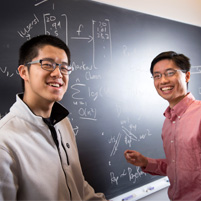Colossal Collaboration

Ray Li & Po-Shen Loh
Carnegie Mellon University's Ray Li (S'17) and Assistant Professor of Mathematical Sciences Po-Shen Loh add up to be a dynamic team.
Together, they co-founded expii.com, a website that leverages crowdsourcing to develop interactive educational experiences to teach math and science. After completing a more than $1 million round of seed funding, the duo is leading a grassroots effort to improve scientific and mathematical literacy.
Li and Loh describe Expii as the next evolutionary step in online education. Instead of a Massive Open Online Class (MOOC), they call Expii a Massive Open Online Collaboration.
"We are an open collaboration, which empowers every person in the world to collectively author and share the best interactive lessons," Loh said. "Instead of having closed silos that create their own MOOCs, each of which has its own calculus class, why not just build the best interactive calculus class together, like Wikipedia's encyclopedia?"
While most Massive Open Online Classes are developed by single companies or universities, Expii is a platform for crowdsourcing interactive educational experiences. Li, Loh and the Expii team are working to make adding and editing content a simple process. They developed a stripped down coding language that enables anyone, even those with no background in coding, to create interactive, multimedia lessons on pre-selected topics.
Expii also capitalizes on the educational benefits of crowdsourcing. Students at every level are able to participate in the process of developing lessons. They can ask questions as well as answer them, provide feedback and develop new ways to teach material they struggled with.
"Expii was founded by leaders from the math and science enthusiast community itself," Li said. "It provides the opportunity to bring that enthusiasm out of the math community and into the rest of the world."
That passion for math is what brought Li and Loh together. The two first met when Loh volunteered to coach a team of Western Pennsylvania mathletes that included Li. A few years later, the two reconnected while Li was preparing for the International Mathematical Olympiad.
Loh, who serves as the head coach of the U.S. International Mathematical Olympiad Team, has always had a passion for math competitions. He sees them as an outlet for gifted students with an analytic bent.
"The International Mathematical Olympiad and math contests serve as a bridge from ordinary school math and science to the real math and science that one encounters later either at universities like Carnegie Mellon or as a professional in those those fields," Loh said.
Ray Li was attracted to CMU because of the Knaster-McWilliams Scholars program, which combines significant financial aid and early access to research opportunities. Through the program he has access to professors, like Loh and fellow math professor John Mackey, who push him to excel.
During Li's freshman year, while having dinner with Loh, they began discussing the idea of a website that would index all of the educational content currently available on the Internet. From that seed came the idea of a math and science focused site that would pull from other online educational materials.
With help from CMU's Center for Innovation and Entrepreneurship, they were able to launch quickly.
"By the end of fall semester [2013] we had decided we would follow through with our idea," Li said. "By January, we were incorporated."
The year-old startup is still in its earliest stages — they're focusing on improving the user experience through partnerships with students from CMU's Design, Information Systems and Human-Computer Interaction programs — but both co-founders share a passion for teaching and a desire to improve the public's knowledge of how math and science intersect with their daily lives.
"The role of a coach, and the role of a teacher, is to inspire," Loh said. "All professors would love to teach higher-level material, and to take their students way out to the cutting edge. But not everyone is able to enter college at that level, often because of a lack of access to resources. If we can provide an interactive resource — a virtual tutor — it will help universities bring in students who are very prepared and ready to launch to the next level."
Related Links: expii.com | Mellon College of Science | Department of Mathematical Sciences | Center for Innovation and Entrepreneurship | Dietrich College | School of Computer Science
